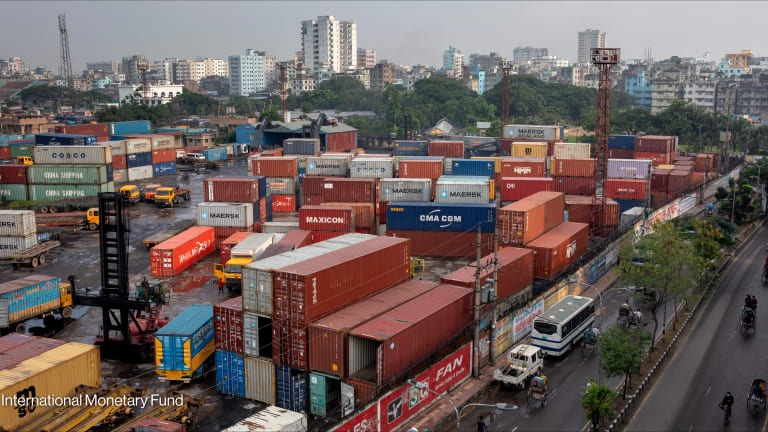
The world’s largest and most influential providers of aid reaffirmed their commitment to transparency this year. A United Nations panel advising on the framework to follow the Millennium Development Goals called for a “data revolution,” and G-8 members specifically committed to implement the International Aid Transparency Initiative, the only internationally agreed standard for publishing aid information.
Transparency is a key pillar of sustainable development, an essential piece of the puzzle to enable effectiveness, accountability and social change. In recent years, information on aid spending has slowly become more available and open. But turning transparency promises into reality can be hard.
The Aid Transparency Index is the industry standard for assessing transparency among the world’s major donors. The ATI holds agencies to account for the delivery of their aid transparency promises, while also encouraging progress to reach those goals. This year’s results show there is a leading group of organizations publishing large amounts of useful information on their current aid activities.
The top ranking agency is the U.S. Millennium Challenge Corp., while China takes the last place. MCC publishes its aid information in the IATI format, right down to results level; in contrast, there is no way to confirm even the total amount of aid provided by China.
What is most troubling, however, is that the average score for all 67 organizations is low. More telling is that 25 of these organizations scored less than 20 percent. That statistic is clear: No matter how many international commitments are made, no matter how many speeches there are around openness, a startling amount of organizations are still not delivering on their transparency goals.
France is the third-largest donor in the Democratic Republic of Congo, spending more than $1 billion in 2011. But we could find no comprehensive listing of the country’s current aid activities for DRC — or for any other recipient country.
Similarly, Japan is the second-largest donor to the DRC, spending more than $1.2 billion in 2011. But its database does not include basic information on the projects it’s funding, such as start or end dates of projects or their current status.
That’s more than $2 billion in aid to DRC — an aid dependent and fragile state — which remains unmonitored. And even from the information we could get, much of it was out of date, patchy and difficult to compare with that of other funders operating in DRC.
It’s not all bad, though: France and Japan have both committed to publishing their aid data to IATI by 2015 as part of the G-8 commitments, so there is time to correct this poor practice.
Indeed, some donors have made real progress over the past year. It is great that they have released a lot more data — but that is not enough on its own. The development community now needs to make sure the information is as useful as possible. That is why the ATI uses a new methodology this year that assesses not just what information is published, but also the quality of that information.
For example, publishing budgets in PDF format is more transparent than not publishing them at all, but it’s not all that useful if the information is hard to access, compare and reuse. Organizations receive lower scores in the ATI for publishing in less useful formats, or for not publishing the information consistently.
In contrast, information published in a standardized, comparable format across all project and activity levels makes it possible to compare different donors’ data. This is incredibly useful. The top 27 agencies all publish at least some current information in the most useful format. Because their data is more useful, organizations publishing in this way score higher in the ATI.
Several governments and organizations, including Canada, GAVI, Germany, the U. N. Development Program, UNICEF and the U.S. Treasury have made big improvements this year by publishing more information in accessible and comparable formats. They have effectively leapfrogged others that have not made any significant changes to the amount of information they publish or publish in less useful formats such as websites or PDFs.
The basic principle that aid information should be publicly available in easy-to-use formats is now accepted as an essential component of international development — from the debates around the post-2015 framework to the hundreds of commitments made by countries involved in the Open Government Partnership.
Five years ago, when Publish What You Fund began the campaign for aid transparency, the challenge was to get organizations publishing data, in order to demonstrate how people could use this information.
Five years on, the challenge is to increase confidence in this new IATI data by encouraging donors to improve the quality and coverage of their information.
Wide-ranging use of aid information is likely to bolster donors’ resolve in constantly improving the breadth and quality of their publication, as the U.K. Department for International Development has done using IATI data for its new open data portal, the Development Tracker. Understanding how and why people use aid information will continue to be a goal for all development actors, and will mean working closely with diverse partners to make a real difference.
I’m delighted that there is a lot more data out there — now we must make it a useful weapon in the fight to end poverty.
Join the Devex community and gain access to more in-depth analysis, breaking news and business advice — and a host of other services — on international development, humanitarian aid and global health.








